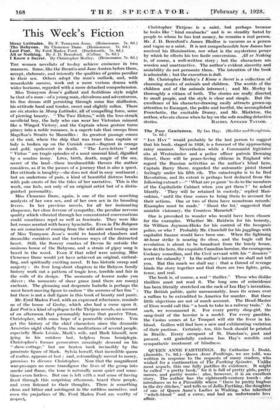The Poor .Gentleman. By Ian Hay. (Hodder - and Stoughton. 7s. 6(1.)
" ' `` IAN ILO,' " would probably be the last person to suggest that his book, staged in 1928; is a forecast of the approaching rainy summer. Nevertheless while a Communist legislata sits at WeStminster and a police officer patrols Downing Street; there will be peace-loving citizens in England 'who regard the Russian activities, as the author's _ blind hero; Captain Barry Shere, regarded the automatic pistol 'thrust feelingly under his fifth rib. The catastrophe is to be Red Revolution, and its extent is perhaps best deduced from the following extract :-" What are ye gaun ' to do to the members- of the Capitalistic Cabinet when you -get them ? ' he asked bluntly. ' They 'will be retained in custody,' replied- Man=
oukian, ' until the time comes to bring them to account for
their actions. One or two of them have monstrous records.' Examples must be made." Shoot the lot,' suggested that amiable visionary, the Countess Mazarieff."
One is provoked to wonder who would have been chosen for the examples. Whether Mr. Baldwin for his hotiesty7. Sir William Joynson-Hicks for his control of the bourgeoiS police, or who ? Probably Mr. Churchill for his jugglings with capitalist finance would have been one. When the lightniiik 48-hour strike is nearing its close, and the bugle call foi revolution is about to be broadcast from the lonely house,.
how do the hero, the exquisite Canadian heroine, the courageous Cockney comedian, and the Civil servant with his " dossiers" avert the calamity? In the author's interest we shall not tell you. But this. much we shall say : that a thread of revenge binds the story together and that there are two fights, grim, tense, and real.
The book is of course, a real " thriller." Those who dislike thrillers must not read it. The long -arm of coin.cidence has been literally stretched on the rack of Ian Hay's invention. The British public, quite unreasonably, loSes its senses over a ruffian to be extradited to America for murder. Brit these little objections are not of much account. The Head-Mastei of Eton would call this " a book to take in a railway train." As such, we recommend it. For every pretty shop-girl, the sang-froid of the heroine is a model. For every gambler, the Casino scenes at Le Touquet will stir the fever in his blood. Golfers will find here a new and exhilarating variation of their pastime. Certainly, too, this book should be printed in Braille. Every occupant of St. Dimstan's, past and present, will gratefully endorse Ian Hay's sensible and sympathetic treatment of blindness. . .






































 Previous page
Previous page